What to expect as the person's dementia progresses
Caring for someone with dementia can be a great reward but it can be challenging at times. Prepare yourself by knowing what to expect.
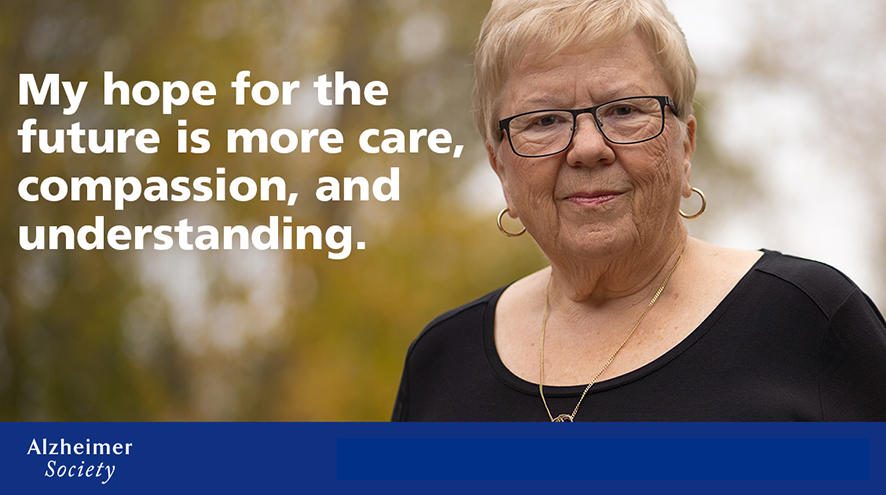
What's next?
"My hope for the future is for more care, compassion and understanding. People with dementia did not choose this path. Those of us living with it take one day at a time, enjoying the good days left and keeping our special memories." – Carol-Ann (pictured above), from Ontario. Carol-Ann is the caregiver for her husband, Stan, who lives with dementia.
If you, or a family member, have recently been diagnosed with Alzheimer’s disease, knowing what to expect as the disease progresses and learning what has helped others can greatly improve your quality of life. There are many people today who have been diagnosed with Alzheimer’s disease who are enjoying each day, as well as planning for their futures. No matter what stage of the disease you or a family member is experiencing, information is important to understanding and living with it.
Here are five tips to help you start planning ahead
- Read What to expect | Print-friendly version (PDF).
- Arrange financial, legal and care matters and decide who will be responsible for these functions. Follow their wishes, if you know them. Otherwise, decisions will need to be based on their lifelong values and desires and what you think the person would want.
- Learn about the programs and services that will be available as needs change (homecare, respite care, community programs like Meals on Wheels and care homes).
- Learn what to look for in a care provider or long-term care home.
- Your local Alzheimer Society can advise you on the above issues and the kinds of professionals who can help to address them.
There is currently no cure for most types of dementia – including the dementia caused by Alzheimer's disease. These types of dementia are what we call “neurodegenerative.” The progression of these dementias cannot be reversed right now; symptoms gradually get worse. But current treatment options and brain-healthy lifestyle choices can help manage some of the symptoms.
This document is one in a five-part series on the stages of Alzheimer’s disease and is written for the person with the disease, their family and caregivers. This overview provides a summary of the stages and information on end-of-life issues.
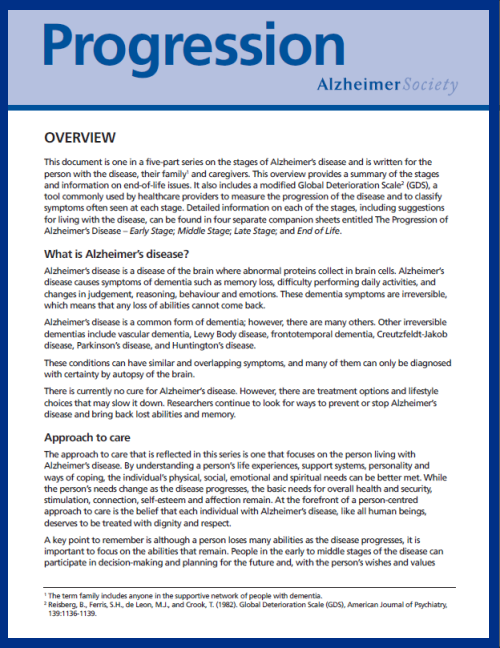
What to expect in the early stage
The early stage of Alzheimer's disease (also referred to as "mild Alzheimer's disease) refers to people of any age who have mild impairment. This differs from the term "young onset" or "early onset," which refers to people who have been diagnosed with Alzheimer's disease at a younger age than usual.
Some people aren’t aware that they have the disease during this stage, and they may not be diagnosed until they are past it.
Common symptoms in the early stage include:
- Forgetfulness,
- Difficulty learning new things and following conversations,
- Difficulty concentrating or limited attention span,
- Mood shifts including apathy and depression and
- Mild co-ordination problems.
People in this stage often need little help. They may understand how they are changing and be able to talk to others about their experience. They may also wish to help plan and direct their future care.
This document is one in a five-part series on the stages of Alzheimer’s disease and is written for the person with Alzheimer's disease and caregivers. The early stage of Alzheimer's disease is featured in this sheet.
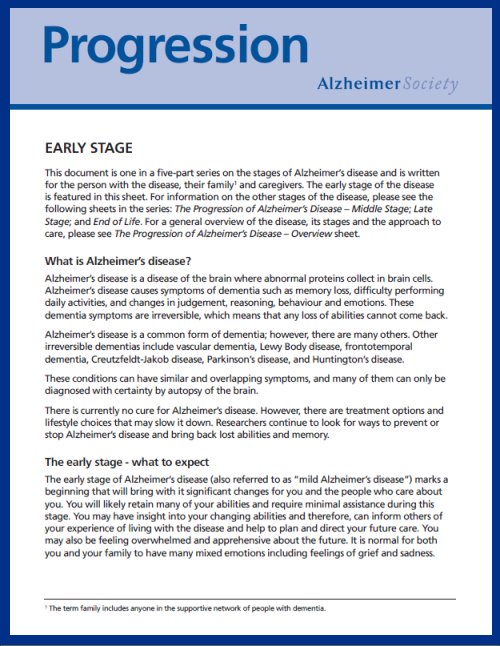
What to expect in the middle stage
The middle stage of Alzheimer’s disease is also called "moderate Alzheimer's disease." In this stage, thinking and memory continue to deteriorate but many people will still be somewhat aware of their condition. People in the middle stage of Alzheimer’s disease need help with many daily tasks. Although a person loses many abilities as the disease progresses, it is important to focus on their remaining abilities. People with Alzheimer’s disease continue to experience emotions, although they may not be able to express them in the same ways they did before.
For caregivers, this is the point where:
- Your involvement in the person's care increases substantially,
- Moving the person to a long-term care home may be considered for the first time,
- Programs and services in your community can be a big help, providing support in the form of adult day programs, respite care and more,
- Everyone involved will need help and support because of the increasing challenges faced by those with Alzheimer's disease and their family.
Even though the middle stage of the disease brings with it more challenges, you can help make life easier for the person:
- Speak with a doctor about treatment options.
- As well, pay attention to other issues of daily health, such as regular medications and dental needs, among others.
- Although the middle stage requires some additional and different strategies than for the earlier stage, some of the same strategies will still apply.
This document is one in a five-part series on the stages of Alzheimer’s disease and is written for the person living with Alzheimer's disease and caregivers. The middle stage of Alzheimer's disease is featured in this sheet.
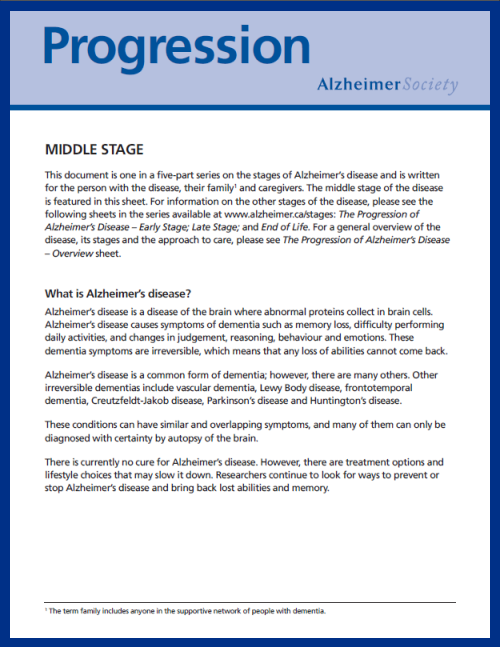
What to expect in the late stage
The late stage of Alzheimer’s disease may also be called the “severe” or “advanced” stage.
In this stage, the person living with Alzheimer's eventually becomes unable to communicate verbally or look after themselves. Nonverbal communication becomes increasingly important.
The person in the late stage of Alzheimer's will experience:
- Severe impairment in memory, processing new information and recognizing time and place,
- Losing capacity for recognizable speech and
- The loss of the ability to eat, walk and use the toilet without assistance.
Care may be required 24 hours a day. At this stage, it's vital for caregivers to continue to support the person to ensure the highest quality of life possible.
This document is one in a five-part series on the stages of Alzheimer’s disease and is written for the person living with Alzheimer's disease and caregivers. The late stage of Alzheimer’s disease is featured in this sheet.
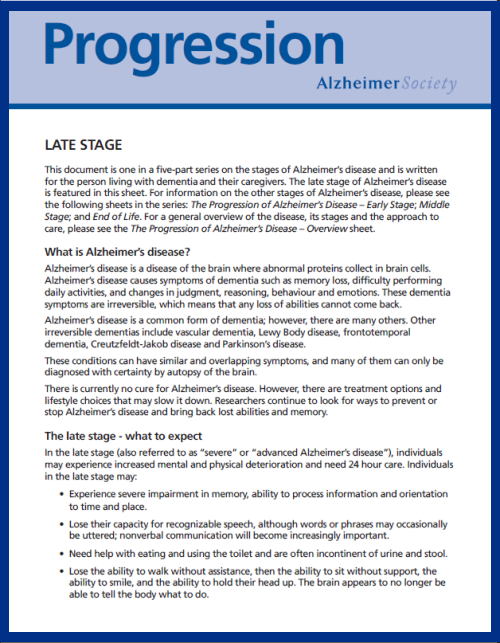
What to expect at the end-of-life
The person in the final months of dementia will experience increased mental and physical deterioration, eventually needing 24-hour care.
When the person nears death, the focus shifts to palliative care and comfort. Still, it's vital to respect the person's wishes as they would have wanted.
As with the care of someone living with a terminal illness, the person's physical, emotional and spiritual needs must be tended with care to ensure that they are as comfortable as possible when the time of passing comes.
This document is one in a five-part series on the stages of Alzheimer’s disease and is written for the person living with Alzheimer's disease and caregivers. The end of life stage of Alzheimer's disease is featured in this sheet.
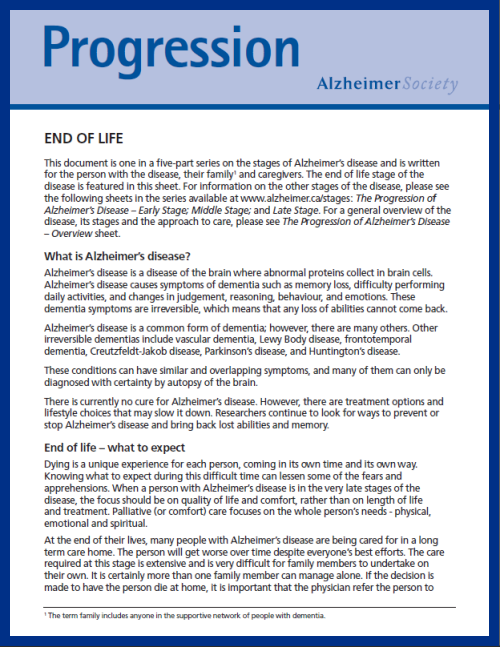
The needs of people living with dementia at the end of life are unique and require special considerations. Please visit our section on end-of-life care to learn more.
Suggestions from people living with dementia
Learning about the experiences of people living with Alzheimer's disease can be helpful to those who support them. The following are some suggestions from people with the disease from Memory Problems?, written by the Early Stage Support Groups in the North/Central Okanagan Region of the Alzheimer Society of B.C.:
- "Please don't correct me. I know better—the information just isn't available to me at that moment."
- "Remember, my feelings are intact and get hurt easily."
- "I usually know when the wrong word comes out and I'm as surprised as you are."
- "I need people to speak a little slower on the telephone."
- "Try to ignore off-hand remarks that I wouldn't have made in the past. If you focus on it, it won't prevent it from happening again. It just makes me feel worse."
- "I may say something that is real to me but may not be factual. I am not lying, even if the information is not correct. Don't argue; it won't solve anything."
- "If I put my clothes on the chair or the floor, it may be because I can't find them in the closet."
- "If you can tell that I am having trouble, please don't draw attention to it. Try to carefully help me through it so nobody else will be aware of the problem."
- "At a large gathering, please keep an eye on me because I can get lost easily! But please don't shadow my every move. Use gentle respect to guide me."
- "Sometimes I sense that you think I am faking these problems. What you don't see is my terrible confusion and my hurt knowing how you feel."
- "I don't mean to frustrate you. I know you get impatient and tired of telling me things three times in a row. Please be patient."
- "Ask me what I think or want. Don't assume that you know."
- "Believe I still love you, even if I am having trouble showing it."
Taking care of yourself
Despite your best efforts, caring for someone with dementia becomes harder as the condition progresses, and the person you are caring for becomes more dependent on you. This is a time when many caregivers need more support for themselves. The following tips are to help caregivers take care of themselves and plan for the future.
- Avoid isolation and loneliness by keeping up with social activities and contact with others as much as possible.
- Take care of your own health.
- Join a caregiver support group to connect with others living with the day-to-day issues of dementia and facing practical challenges, grief and loss.
- Watch for signs of stress and how it can affect your health and ability to provide care.
- Be aware that you may already be grieving the gradual losses caused by the disease.
- Seek professional help if feelings of depression or anxiety are overwhelming.
- Be flexible about routines and expectations.
- Try to be positive and use humour as a part of care strategies.
- Make time for yourself by using respite care options, including adult day programs, professional homecare services, other family members or friends, volunteer caregivers and friendly visiting programs.
Help and support from the Alzheimer Society
Living with dementia at any stage can be very challenging. It is normal to feel a variety of emotions, including grief and loss, throughout all stages. It is important to acknowledge your feelings, care for yourself and seek the practical help and emotional support you need.
The Alzheimer Society in your community can provide educational resources to help you learn more about the dementia, referrals to help you access the practical support you need, and one-on-one and group support to help you cope with the emotional impact of the condition.
Updated November 24, 2022
